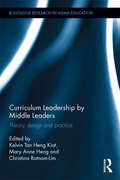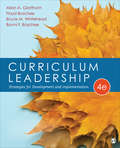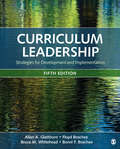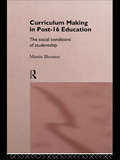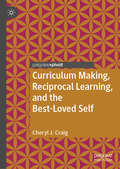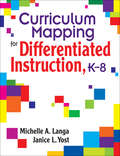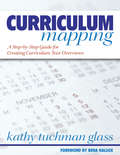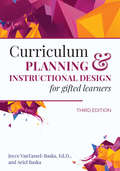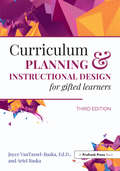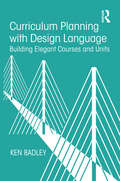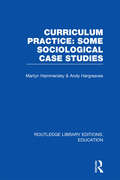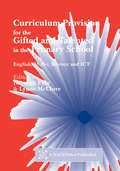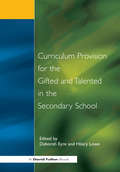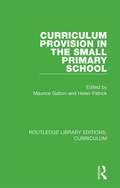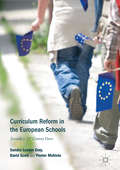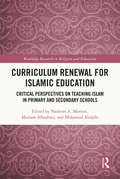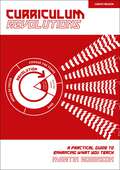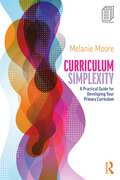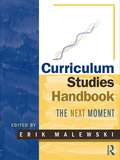- Table View
- List View
Curriculum Leadership by Middle Leaders: Theory, design and practice (Routledge Research in Asian Education)
by Mary Anne Heng Kelvin Tan Heng Kiat Christina Ratnam-LimCurriculum Leadership by Middle Leaders focusses on major issues relating to the continuing national and international discourse on curriculum leadership, and highlights the vital role of middle leaders in schools. School leadership has focused primarily on first-order change involving school leaders or principals. This book seeks to put the spotlight on second-order change that involves curriculum leadership and professional development support on the part of middle leaders for more sustainable and long-term change in teaching and learning that will influence what happens in classrooms. With timely and thought-provoking contribution from authors who pursue a range of scholarly interests in multiple educational settings, the book is guided by several underlying questions: How might we re-envision curriculum leadership so that it addresses both local and global concerns and aspirations? How might we better grasp how middle leaders understand and respond to the pressures of educational reform initiatives? How might middle leaders transform pressures into possibilities? This book will appeal to current teachers, those currently undertaking teacher training and students or academics carrying out research in the field of educational leadership.
Curriculum Leadership: Strategies for Development and Implementation
by Allan A. Glatthorn Bruce M. Whitehead Dr Floyd A. Boschee Bonni F. BoscheeCreating an innovative and successful curriculum Curriculum Leadership: Strategies for Development and Implementation, Fourth Edition is a one-of-a-kind resource written for educational leaders--administrators and teachers--who want to successfully restructure and enhance school curriculum. Authors Allan A. Glatthorn, Floyd Boschee, Bruce M. Whitehead, and Bonni F. Boschee provide innovative and successful curriculum ideas, including reflective case studies, “Keys to Leadership” sections, curriculum tips, and “Challenge” sections with key issues and questions in every chapter. Also interspersed throughout the book are tried and true strategies that provide administrators with innovative ideas on meeting state and national standards. This is a much needed, highly informative, and easy-to-read account of curriculum development and change for curriculum leaders, those teaching curriculum courses, and those aspiring to become curriculum decision makers. It provides the knowledge and skills needed to develop and implement a PK–12 school curriculum.
Curriculum Leadership: Strategies for Development and Implementation
by Allan A. Glatthorn Bruce M. Whitehead Dr Floyd A. Boschee Bonni F. BoscheeCreating an innovative and successful curriculum Curriculum Leadership: Strategies for Development and Implementation, Fourth Edition is a one-of-a-kind resource written for educational leaders--administrators and teachers--who want to successfully restructure and enhance school curriculum. Authors Allan A. Glatthorn, Floyd Boschee, Bruce M. Whitehead, and Bonni F. Boschee provide innovative and successful curriculum ideas, including reflective case studies, “Keys to Leadership” sections, curriculum tips, and “Challenge” sections with key issues and questions in every chapter. Also interspersed throughout the book are tried and true strategies that provide administrators with innovative ideas on meeting state and national standards. This is a much needed, highly informative, and easy-to-read account of curriculum development and change for curriculum leaders, those teaching curriculum courses, and those aspiring to become curriculum decision makers. It provides the knowledge and skills needed to develop and implement a PK–12 school curriculum.
Curriculum Leadership: Strategies for Development and Implementation
by Allan A. Glatthorn Bruce M. Whitehead Bonni F. Boschee Floyd A. BoscheeCurriculum Leadership: Strategies for Development and Implementation helps current and aspiring administrators, teachers, and curriculum directors successfully restructure, enhance, and implement school K–12 curriculum. This foundational book highlights 21st century educational ideas and advocacy, while also remaining focused on tried and true strategies for meeting state and national standards in today’s diverse classrooms. Featuring an array of new scholars, researchers, and case studies, the Fifth Edition: centers on the importance of teachers and teacher-leaders in the area of curriculum development; promotes the crucial role of special education and its contribution to the overall curriculum development process; and includes a renewed emphasis on concurrent learning and creating stimulating online discussions. With the support of this thought-provoking and extensively researched text, readers will develop a working and thorough foundation of curriculum to effectively implement in the classrooms of the future.
Curriculum Leadership: Strategies for Development and Implementation
by Allan A. Glatthorn Bruce M. Whitehead Bonni F. Boschee Floyd A. BoscheeCurriculum Leadership: Strategies for Development and Implementation helps current and aspiring administrators, teachers, and curriculum directors successfully restructure, enhance, and implement school K–12 curriculum. This foundational book highlights 21st century educational ideas and advocacy, while also remaining focused on tried and true strategies for meeting state and national standards in today’s diverse classrooms. Featuring an array of new scholars, researchers, and case studies, the Fifth Edition: centers on the importance of teachers and teacher-leaders in the area of curriculum development; promotes the crucial role of special education and its contribution to the overall curriculum development process; and includes a renewed emphasis on concurrent learning and creating stimulating online discussions. With the support of this thought-provoking and extensively researched text, readers will develop a working and thorough foundation of curriculum to effectively implement in the classrooms of the future.
Curriculum Making in Post-16 Education: The Social Conditions of Studentship
by Martin BloomerIt is widely agreed that the post-16 curriculum in England and Wales is inadequate, mainly due to the successive reforms of various governments.YTS was a reaction to problems of youth unemployment, CPVE and BTEC embraced a 'broad' concept of vocationalism, and even with the introduction of NVQ and GNVQ the A-level retains its gold-standard in the eyes of many. The post-16 curriculum that has emerged is hardly coherent. So how can teachers translate an externally imposed curriculum into a meaningful learning experience for students?Drawing on solid research in post-16 education, this book makes explicit the nature of flaws in policy, and provides an account of how teachers and students construct their roles. It puts forward the case for a radical reappraisal and identifies appropriate aims and organising principles for a post-16 curriculum for the future.Martin Bloomer is currently Dean of the Faculty of Education at Exeter University.
Curriculum Making, Reciprocal Learning, and the Best-Loved Self (Intercultural Reciprocal Learning in Chinese and Western Education)
by Cheryl J. CraigThis book revolves around curriculum making, reciprocal learning, and the best-loved self. It draws on extensive school-based studies conducted with teachers in the United States, China, and Canada, and weaves in experiences from other cross-national projects, keynote addresses, archival research, and editorial work. The elucidation of the ‘best-loved self’ drives home the point that teachers are more than the subject matter they teach: they are students’ role models and allies. Curriculum making and reciprocal learning relationships enrich teachers’ and students’ being and becoming as they live curriculum alongside one another—with the goal of more satisfying lives held firmly in view.
Curriculum Mapping for Differentiated Instruction, K-8
by Michelle A. Langa Janice L. YostThis easy-to-use guide to curriculum mapping and instructional planning for K–8 student-centered classrooms blends standards, rubrics, interdisciplinary units, and a "Teacher's Tool Chest" for successful learning.
Curriculum Mapping: A Step-by-Step Guide for Creating Curriculum Year Overviews
by Kathy Tuchman GlassThis resource provides a user-friendly process for creating a curriculum year overview that meets standards. Includes developed curriculum maps, blank templates, and more!
Curriculum Murders: A Margo Brown Mystery
by Marlis DayMargo and her fellow teachers are stunned to find one of their own floating dead in the school pool on Homecoming Day. That's the second murder of a faculty member in as many years, and the murders are exactly a year apart. Margo concludes that a serial killer is stalking his former instructors, but she will have to hurry to prevent disaster: Homecoming celebrations are only a few days away.
Curriculum Planning and Instructional Design for Gifted Learners
by Ariel Baska Joyce VanTassel-BaskaThis updated third edition of Curriculum Planning and Instructional Design for Gifted Learners:Is a guide to designing curriculum for the gifted at any level of learning and in any subject area.Addresses the need to differentiate at all levels in the design process.Shows how to customize curriculum for advanced learners.Uses national standards, such as the Common Core State Standards and Next Generation Science Standards, as the point of departure for design.Demonstrates how the differentiation process works in math, science, social studies, and English language arts.Special needs gifted learners, such as those who are twice-exceptional, second language learners, students from poverty, and minority students, are included as a group for further differentiation and customization of curriculum and instruction. The book may also be used to provide a curriculum guide for teachers in a master's program in gifted education or those taking endorsement classes.
Curriculum Planning and Instructional Design for Gifted Learners
by Ariel Baska Joyce VanTassel-BaskaThis updated third edition of Curriculum Planning and Instructional Design for Gifted Learners:
Curriculum Planning with Design Language: Building Elegant Courses and Units
by Ken BadleyCurriculum Planning with Design Language provides a streamlined, adaptable framework for using visual design terminology to conceptualize instructional design objectives, processes, and strategies. Drawing from instructional design theory, pattern language theory, and aesthetics, these ten course and unit design principles help educators break down and clarify their broader planning tasks and concerns. Written in clear, direct prose and rich with intuitive examples, this book showcases insights leading to effective curriculum design that will speak equally to pre-service and experienced educators.
Curriculum Practice: Some Sociological Case Studies (Routledge Library Editions: Education)
by Andy Hargreaves Martyn HammersleyWhen first published this book was one of the first collections of empirical research in the area of the knowledge transmitted in schools and the responses of students to it. It includes studies of the histories of particular school subjects and of how the knowledge they embody is presented in the classroom. Attention is also given to the effects of gender stereotypes among teachers and pupils, both on pupils’ selection of courses to study and on their reactions to particular subjects in the classroom. The other major topic in this collection is the way external examinations shape the nature of the school curriculum and how it is taught. There are studies of how pupils and teachers adapt to the exam system, and of how that system and its role in the accountability of schools, have changed in recent years. The articles collected here throw into relief important aspects of what is taught in schools, and they do this on the basis of a solid foundation of empirical research.
Curriculum Provision for the Gifted and Talented in the Primary School: English, Maths, Science and ICT (Nace/fulton Ser.)
by Lynne McClure Deborah EyreThe authors of this book offer practical help to teachers in making day-to-day provision for the gifted and talented pupils in their classroom. Designed mainly for primary teacher, intending teachers and teacher trainers, the book draws together current findings in curriculum provision in the core subjects, links theory and practice in such a way that the readers can benefit from exemplar material, and allows them to adapt their own teaching to provide an inclusive curriculum for the gifted and talented children they teach.
Curriculum Provision for the Gifted and Talented in the Secondary School (Nace/fulton Ser.)
by Deborah Eyre Hilary LoweThe authors of this book offer practical help to teachers in making day-to-day provision for the able in their classroom. Designed mainly for secondary teachers, teacher educators and senior managers, the book draws together a range of good practice in provision for the most able across all national curriculum subjects. The recommendations for classroom practice are underpinned by sound theoretical perspectives and provide a framework for teachers to evaluate and develop their own provision for able pupils.
Curriculum Provision in the Small Primary School (Routledge Library Editions: Curriculum #7)
by Maurice Galton Helen PatrickOriginally published in 1990. Small primary schools were a source of considerable debate in the 1980s. This balanced and authoritative account is based on the findings of a survey of curriculum provision. It shows that small primary schools differ surprisingly little from their larger counterparts in the content of their curriculum and in the manner of its teaching. It suggests though that pupils in small schools do not necessarily get a better deal than pupils in larger schools. It looks at the future of those schools and discusses clustering and federation to pool resources. Written just as the National Curriculum was about to be introduced, this book is an interesting reflection for students of primary education, curriculum studies and educational administrators.
Curriculum Reform in Ontario
by Laura Elizabeth PintoThis first full account of curriculum policy formulation in 1990s Ontario helps readers understand the real-life experiences of policymakers both within the province and internationally.Having worked as a policy analyst for the Government of Ontario, a public school teacher, and a university professor, author Laura Elizabeth Pinto is uniquely positioned to tackle the key issues of policy formulation: the politics and tensions among different policy actors; the relationships between democracy in education and in policy formation; and the hidden role of privatization.Based on interviews with key policy actors, including ministry bureaucrats, curriculum policy writers, stakeholder consultation participants, and political staffers, Curriculum Reform in Ontario provides a critique of conventional policy formulation processes. Pinto also suggests possibilities for more participatory approaches to policy formulation that can better support the critical role played by schools in creating democratic societies.
Curriculum Reform in the European Schools: Towards A 21st Century Vision
by David Scott Sandra Leaton Gray Peeter MehistoThis book is open access under a CC BY 4.0 license.This open access book examines the modern role of the European School system within the European Union, at a time when the global economy demands a new vision for contemporary education. The European schools are currently in a state of crisis: their 60-year-old tradition of bilingual and multilingual education is being strained by rapid EU expansion and the removal of English speaking teachers as a result of Brexit. Their tried and tested model of mathematics and science education has rapidly been overtaken by new developments in pedagogy and assessment research, while recruitment and retention of students and teachers has become increasingly fraught as European member states review what they are, and what they are not, prepared to fund. The authors draw on original and empirical research to assess the European Schools’ place in a new Europe where the entire post-war European Project is potentially at risk. This well-researched volume will be of interest to practitioners working in European schools as well as students and scholars of EU politics and international education.
Curriculum Renewal for Islamic Education: Critical Perspectives on Teaching Islam in Primary and Secondary Schools (Routledge Research in Religion and Education)
by Nadeem A. MemonThis book demonstrates why and how it is necessary to redesign Islamic Education curriculum in the K-12 sector globally. From Western public schools that integrate Muslim perspectives to be culturally responsive, to public and private schools in Muslim minority and majority contexts that teach Islamic studies as a core subject or teach from an Islamic perspective, the volume highlights the unique global and sociocultural contexts that support the disparate trajectories of Islamic Education curricula. Divided into three distinct parts, the text discusses current Islamic education curricula and considers new areas for inclusion as part of a general renewal effort that includes developing curricula from an Islamic worldview, and the current aspirations of Islamic education globally. By providing insights on key concepts related to teaching Islam, case studies of curriculum achievements and pitfalls, and suggested processes and pillars for curriculum development, contributors present possibilities for researchers and educators to think about teaching Islam differently. This text will benefit researchers, doctoral students, and academics in the fields of secondary education, Islamic education, and curriculum studies. Those interested in religious education as well as the sociology and theory of religion more broadly will also enjoy this volume.
Curriculum Revolutions: A practical guide to enhancing what you teach
by Martin RobinsonCurriculum Revolutions is a tool to assist schools in creating, building and maintaining a joined-up curriculum that is cohesive and coherent. Martin Robinson's unique curriculum wheel leads you through a continuous cycle of planning, designing, delivering, reflecting upon and reviewing your curriculum. The process will involve your managers, teachers and pupils, ensuring all understand the importance of a well-functioning curriculum as the cornerstone of the school and the quality of education it delivers. Good curriculum design is a collaborative affair, so each revolution of the wheel focuses on how to get staff working together productively. Most importantly, from a design point of view, Curriculum Revolutions explores the potential pitfalls in the curriculum shape that a school adopts, either consciously or unconsciously. Robinson argues that a sophisticated understanding of the underlying structure, or 'thought architecture', can make all the difference to the quality of the continuing, unfolding project of good curriculum design.
Curriculum Revolutions: A practical guide to enhancing what you teach
by Martin RobinsonCurriculum Revolutions is a tool to assist schools in creating, building and maintaining a joined-up curriculum that is cohesive and coherent. Martin Robinson's unique curriculum wheel leads you through a continuous cycle of planning, designing, delivering, reflecting upon and reviewing your curriculum. The process will involve your managers, teachers and pupils, ensuring all understand the importance of a well-functioning curriculum as the cornerstone of the school and the quality of education it delivers. Good curriculum design is a collaborative affair, so each revolution of the wheel focuses on how to get staff working together productively. Most importantly, from a design point of view, Curriculum Revolutions explores the potential pitfalls in the curriculum shape that a school adopts, either consciously or unconsciously. Robinson argues that a sophisticated understanding of the underlying structure, or 'thought architecture', can make all the difference to the quality of the continuing, unfolding project of good curriculum design.
Curriculum Simplexity: A Practical Guide for Developing Your Primary Curriculum
by Melanie MooreAre you a busy teacher, subject lead or senior leader looking to improve your curriculum? Based on the theory of simplexity, the idea that clarity and logic can make even the most complex tasks manageable, Curriculum Simplexity offers a practical and systematic planning aid, guiding readers through the process of building a robust, coherent whole-school curriculum. Recognising the role of teachers’ autonomy and professional judgement, this essential read provides space for the flexibility and creativity needed for teachers to reflect their own values, content, aims and outcomes within the curriculum.Divided into a series of easily digestible chapters and filled with templates, worked examples and planning formats, this book unpacks the process of creating a curriculum. Topics explored include, but are not limited to: The importance of pedagogy Good subject leadership Building a curriculum progression framework Implementing, delivering and evaluating your curriculum Assessment Highly practical and written in an accessible style, teachers are encouraged to reflect on their curriculum planning, development and delivery. This is an essential read for any teacher, subject lead or senior leader who wishes to improve their curriculum and support positive learning outcomes within their school.
Curriculum Studies
by Jonathan TummonsCurriculum is a key issue for trainee teachers in the Lifelong Learning Sector and a core component of most courses. It lies at the heart of the work of teachers and trainers, it shapes the programmes and courses that are taught, and dictates which students can have access to courses. What goes in to the curriculum is argued over by governments, employers, parents and educationalists. How the curriculum is funded can change on a yearly basis. Access to a particular curriculum can raise or diminish the life chances of the learners involved. This book provides an accessible and up to date overview of the key issues surrounding the curriculum. Written for all those working towards QTLS, it provides examples and case studies from working FE colleges, adult education centres and work-based learning contexts as well as offering succinct summaries of key theories and debates relating to the curriculum. This fully revised second edition reflects the latest policies and thinking, has a new chapter on the implications of e-learning on curricula, and includes a full glossary of key terms and concepts. Jonathan Tummons has worked in higher education since 1995. After six years as a lecturer in teacher education in the further education sector, in 2009 he took up his current post as senior lecturer in education at Teesside University where he is also research co-ordinator for education and a member of the management board for the Social Futures Institute, Teesside's research centre for the social sciences.
Curriculum Studies Handbook - The Next Moment (Studies in Curriculum Theory Series)
by Erik MalewskiWhat comes after the reconceptualization of curriculum studies? What is the contribution of the next wave of curriculum scholars? Comprehensive and on the cutting edge, this Handbook speaks to these questions and extends the conversation on present and future directions in curriculum studies through the work of twenty-four newer scholars who explore, each in their own unique ways, the present moment in curriculum studies. To contextualize the work of this up-and-coming generation, each chapter is paired with a shorter response by a well-known scholar in the field, provoking an intra-/inter-generational exchange that illuminates both historical trajectories and upcoming moments. From theorizing at the crossroads of feminist thought and post-colonialism to new perspectives that include critical race, currere, queer southern studies, Black feminist cultural analysis, post-structural policy studies, spiritual ecology, and East-West international philosophies, present and future directions in the U.S. American field are revealed.
